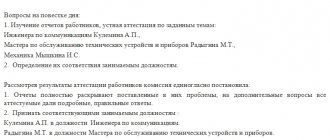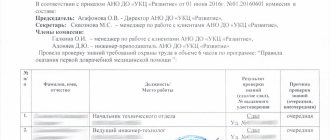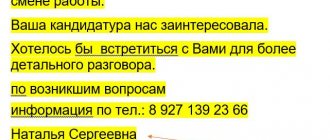Legal aspects of certification
The concept of a traditional grading system is introduced by current laws. This is the name of the procedure, the order, the content of which is regulated by the employer, making decisions independently.
There is no specific article on skills testing in the labor code. But in Article 81 of the same code they write that the basic rules can be approved in a local act issued for a specific enterprise.
An important nuance is that the employer organizes the development of regulations on inspections independently. But he is still obliged to take into account the opinion of the trade union. If there are no such associations, then nothing needs to be agreed upon.
The feasibility of conducting certification at the enterprise
Employee professionalism plays a very important role for any organization, but the reality is that every year there are many changes in different areas of life, business and also legislation. Therefore, having a team of professionals is not easy, but maintaining this professionalism is even more difficult. Therefore, very often employers decide to regularly conduct personnel assessments, which allows the employer to:
- Identify employee weaknesses and develop retraining and advanced training programs;
- Dismiss employees who are not suitable for their position or transfer them to a position with lower job responsibilities;
- Certification can also provide insight into who is worthy of advancement in their career, to a leadership position, whether salary increases can be achieved, etc.
- You can also get feedback from employees about any dissatisfaction and failures in the organization’s personnel policy.
Who is required to undergo certification?
The laws do not restrict employers. They can select any categories of employees when organizing such checks. But in practice it is recommended not to include the following persons in the lists:
- Those with whom a fixed-term employment contract has been signed.
- Minors.
- Old age pensioners.
- Those who took parental leave worked for less than 1 year after leaving the previous such leave.
- If you have worked in the position for less than 1 year.
- Pregnant women.
The rest of the personnel are included on the lists to study the level of training without any problems.
Types of certification
Depending on the timing of the certification events, they can be divided into 2 large groups.
| Planned, or regular. | Such inspections are organized according to a schedule, at certain time intervals. An example is an analysis of employee performance every few years. The manager himself decides what the frequency will be. |
| Unscheduled, extraordinary | Allows organization on an emergency basis. For example, when an organization changes staffing or wages, a whole batch of defective products is identified. Qualification testing may be organized only for specific categories of employees. Moreover, if a translation is being carried out that requires an event. |
Some managers conduct one-time assessments. Including for employees who are just being hired.
Regulatory documents regulating the creation of a certification commission at the enterprise
| Name of the normative legal act | Document Number | Description |
| Labor Code | Article 81 | This article provides an explanation for dismissal due to professional incompetence of an employee, which can be established after certification. |
| the federal law | No. 90 Point 3 | Claims that the certification procedure is approved by labor legislation (this applies to certain budgetary, government organizations, Social Insurance Fund, etc.), as well as internal regulations of the enterprise |
Rate the quality of the article. Your opinion is important to us:
Order of conduct
An important condition for checking the suitability of employees for positions is clearly defined responsibilities. Usually, for this purpose, an employment contract is properly drawn up. The employer is responsible for providing conditions for quality work performance.
Employees will not be able to perform functions properly if they do not have at least some of the tools and equipment and information materials. In this case, there is a high probability that the dismissal will be considered illegal if it takes place later.
To establish inspection rules, the employer issues a separate internal document. Employees are familiarized with this provision and put their personal signatures on it. Subordinates cannot be punished for non-compliance with established rules unless they are familiarized with the original documents.
Is it necessary to approve the regulations on the procedure for certification of employees?
In most private companies, employee performance reviews are not a requirement. An exception to the general rule are public sector employees (teachers, doctors) and other specialists who, in accordance with regulations, must periodically undergo certification activities.
The basis for certification for many private employers are:
- carrying out personnel rotations in the company in the form of promotion/demotion of employees;
- dismissals of incompetent employees;
- assessment of the level of professional training of personnel in order to determine the need for additional training and advanced training;
- creating additional incentives for the professional growth of employees at the enterprise;
- formation of a personnel reserve from among the most competent specialists.
Preparation
Employee training is also a prerequisite. They must receive information about the essence of the procedure. After this, certain actions are performed:
- Compiling lists of event participants.
- Drawing up characteristics for each or other document, which provides a detailed description of the work.
- Approval of the certification schedule and composition of the commission by appropriate order.
- Certification
Each employee is allowed to perform the following activities:
- Conversation.
- Passing the test.
- Study of characteristics or sheet for analysis.
All information on the results is entered into a special protocol. At the final stages, the information that was obtained is discussed. After this, a decision is made for each of the subordinates, and the written forms are supplemented with information. The decision made is also communicated to those who were subjected to such verification.
The personal card records the result that was achieved during the certification.
When the certification is completed, the manager makes a decision as to whether the employee is suitable for the position. The order records final thoughts on this matter.
Is there a need for an order to approve the regulations on employee certification?
After developing and agreeing on the content of all necessary sections, the regulation must be approved by the head of the company. There are two options for approving the certification regulations:
- issuance of an order approving the regulation along with all annexes (if any);
- affixing a signature on the position itself next to the “I approve” stamp (indicating the date).
In this case, it does not matter how the provision was approved, the main thing is that it is signed by a person authorized to carry out this operation. Thus, dismissal based on the results of certification may be considered illegal if the regulation on the procedure for conducting certification was signed by an unauthorized person (appeal ruling of the court of the Chukotka Autonomous Okrug dated October 27, 2014 in case No. 33-173/14).
Certification and its results
Based on the results of its work, the commission can issue several recommendations:
- Cash incentive.
- Application of punishments.
- Transfer to another position.
- Assignment to a higher rank.
- Increase or decrease in wages.
- Dismissal.
The manager should not follow these directions without controversy. He only takes note of the information received. If it is decided that the qualification level does not correspond to the position, the option of sending the citizen to retraining courses is acceptable. Or a mentor is assigned to such an employee.
Those for whom the commission has recommended transfer to a higher position may be included in the personnel reserve. This is a relevant solution, for example, if there are currently no suitable vacancies.
If a decision is made to dismiss a citizen, an offer of another position, according to the current level of skills, becomes a mandatory condition. The main thing is to make such proposals in writing in accordance with all requirements.
Information on evaluation commissions
The following persons usually participate in special commissions:
- The authorized representative of the organization responsible for the problem.
- Representatives from the trade union.
- Representative from the employer.
- A specialist whose work at an enterprise is related to labor protection.
The procedure is not complete without representatives of certifying organizations. If violations and errors are detected without such a participant, any conclusions and results will be considered illegal.
Such associations have certain responsibilities:
- Preparation of the final report. It indicates all the information collected during the organization of the event.
- Creating a list with jobs. This is necessary to assess working conditions and identify factors that have a negative impact. Then it is determined whether personal protective equipment is needed.
- Preparation of the necessary documentation. It has not only an organizational character, but also a normative one.
- Evaluation control. All activities aimed at analyzing the available data are carried out independently.
- Filling out certification cards is considered an additional responsibilities of certification commissions.
Who should be included in the certification commission
Question: Who should be included in the certification commission? Should the persons participating in the work of the commission change (alternate)? Should an HR department employee be present at committee meetings if working with personnel is his main functional task?
Answer: It is advisable to form certification commissions on an ongoing basis. It is advisable to include in the commission:
— the head of the structural unit where the certified employee works;
— a representative of the structural unit where the specialist subject to certification works;
— HR employee;
- representative of a trade union organization.
Representatives of other organizations, highly qualified specialists, scientific experts, consultants, etc. may also be invited to the commission.
At large enterprises, as a rule, several certification commissions function simultaneously. The procedure for their formation is determined by the specifics of the activity and the organizational structure of the enterprise. For example, one commission aims to evaluate the professionalism of commercial service employees. Accordingly, a commercial director can be appointed as the chairman of the commission. The knowledge of financial service employees will be assessed by a commission headed by the financial director. Regardless of the size, each commission must include employees (invited experts, consultants, etc.) who specialize in the same field as the person subject to certification, in order to objectively assess the knowledge, skills and abilities of the subject. After all, for example, a commercial director cannot objectively evaluate the activities of a programmer or lawyer. To document decisions, each commission must include a secretary. This person will be responsible for recording the entire progress of the commission’s work and ensuring its activities.
The commission is headed by a chairman. It is advisable to appoint the head of the structural unit where the certified employee works as the chairman. After all, as a rule, the opinion of the chairman is decisive. It is inappropriate to involve the head of an enterprise as the chairman of the commission, who, due to constant employment, will not be able to effectively organize the work of the commission, as a result of which there will be constant violations of the certification schedule, postponements of meetings, etc.
The rights, responsibilities, powers of the certification commission, the procedure for its interaction with various services, employees and management of the enterprise must be determined by local regulations. It is equally desirable to fix the procedure for holding commission meetings, determining quorum, and making decisions.
Author: L. Frantsuzova
Source: https://www.hr-portal.ru/article/kogo-nado-vklyuchit-v-attestatsionnuyu-komissiyu
Share link:








